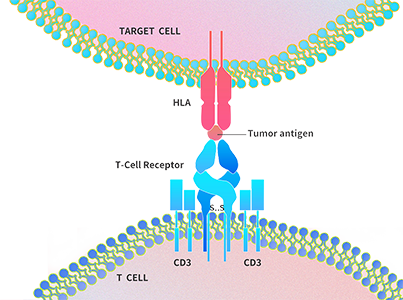- English
- 日本語
- 한국어
- Deutsch
- Français
- Español
No data
官方服务号
招聘公众号





![]() Eukaryotic expression platform for a eukaryotic-based conformation
Eukaryotic expression platform for a eukaryotic-based conformation
![]() Professional MHC-peptide complex R&D technology platform
Professional MHC-peptide complex R&D technology platform
![]() Various types of MHC I and antigens are available
Various types of MHC I and antigens are available
![]() Mature bioactivity verification platform: SPR/ELISA/FACS and more
Mature bioactivity verification platform: SPR/ELISA/FACS and more
![]() Co-expression of heterodimer results in a more natural conformation
Co-expression of heterodimer results in a more natural conformation
![]() Monomer/Tetramer forms
Monomer/Tetramer forms
![]() FITC/PE/APC/Biotin-labeled are optional
FITC/PE/APC/Biotin-labeled are optional




![]() Eukaryotic expression platform for a eukaryotic-based conformation
Eukaryotic expression platform for a eukaryotic-based conformation
![]() Professional MHC-peptide complex R&D technology platform
Professional MHC-peptide complex R&D technology platform
![]() Various types of MHC I and antigens are available
Various types of MHC I and antigens are available
![]() Mature bioactivity verification platform: SPR/ELISA/FACS and more
Mature bioactivity verification platform: SPR/ELISA/FACS and more
![]() Co-expression of heterodimer results in a more natural conformation
Co-expression of heterodimer results in a more natural conformation
![]() Monomer/Tetramer forms
Monomer/Tetramer forms
![]() FITC/PE/APC/Biotin-labeled are optional
FITC/PE/APC/Biotin-labeled are optional




![]() Eukaryotic expression platform for a eukaryotic-based conformation
Eukaryotic expression platform for a eukaryotic-based conformation
![]() Professional MHC-peptide complex R&D technology platform
Professional MHC-peptide complex R&D technology platform
![]() Various types of MHC I and antigens are available
Various types of MHC I and antigens are available
![]() Mature bioactivity verification platform: SPR/ELISA/FACS and more
Mature bioactivity verification platform: SPR/ELISA/FACS and more
![]() Co-expression of heterodimer results in a more natural conformation
Co-expression of heterodimer results in a more natural conformation
![]() Monomer/Tetramer forms
Monomer/Tetramer forms
![]() FITC/PE/APC/Biotin-labeled are optional
FITC/PE/APC/Biotin-labeled are optional




![]() Eukaryotic expression platform for a eukaryotic-based conformation
Eukaryotic expression platform for a eukaryotic-based conformation
![]() Professional MHC-peptide complex R&D technology platform
Professional MHC-peptide complex R&D technology platform
![]() Various types of MHC I and antigens are available
Various types of MHC I and antigens are available
![]() Mature bioactivity verification platform: SPR/ELISA/FACS and more
Mature bioactivity verification platform: SPR/ELISA/FACS and more
![]() Co-expression of heterodimer results in a more natural conformation
Co-expression of heterodimer results in a more natural conformation
![]() Monomer/Tetramer forms
Monomer/Tetramer forms
![]() FITC/PE/APC/Biotin-labeled are optional
FITC/PE/APC/Biotin-labeled are optional



